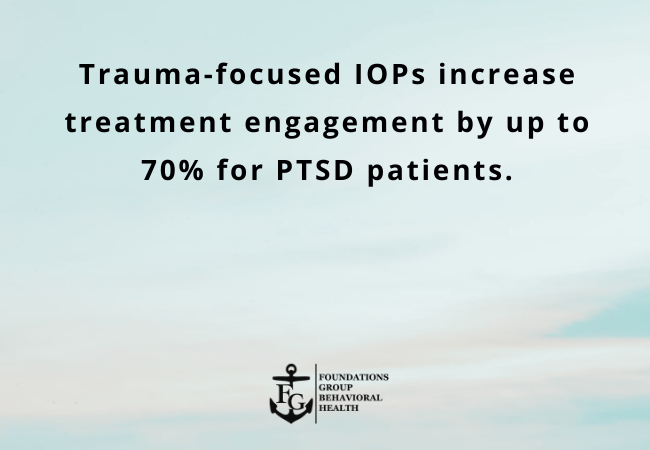When you decide to take your mental health seriously and seek professional help, one of the first decisions you’ll face is choosing the right level of care. You might wonder, Do I need outpatient therapy? Or should I consider an Intensive Outpatient Program (IOP)?
This is a crucial choice — and understanding the difference between these two options can help you start your recovery journey with confidence.
At Foundations Group Behavioral Health, we’ve supported thousands of individuals across Massachusetts who faced the same decision. Whether you’re considering Outpatient Mental Health Therapy Massachusetts, Psychiatric Day Treatment Massachusetts, or our higher-intensity programs, this guide will help you understand your options, your needs, and how we can support you every step of the way.
What Is Outpatient Therapy?
Outpatient therapy is often the first step for individuals seeking mental health support. It’s designed to offer flexible, structured care while allowing you to continue your daily life activities — like work, school, and family responsibilities.
At Foundations Group Behavioral Health, our Outpatient Mental Health Therapy Massachusetts includes:
- One-on-one therapy with licensed clinicians
- Group therapy for shared growth and support
- Medication management (if appropriate)
- Access to specialty tracks like our Anxiety Treatment Program Massachusetts, Depressive Disorder Treatment Program Massachusetts, and Trauma Disorder Treatment Program Massachusetts
Outpatient therapy is excellent for addressing mild to moderate mental health symptoms, learning healthy coping strategies, and maintaining emotional balance. It empowers you to grow while staying grounded in your daily routine.
Key Characteristics of Outpatient Therapy:
- Typically 1–2 sessions per week
- Sessions are about 45–60 minutes long
- Flexible scheduling around personal and work life
- Best for mild to moderate symptoms
- Focused on building coping strategies, emotional insight, and resilience
- Medication management support is available but optional
What Is an Intensive Outpatient Program (IOP)?
An Intensive Outpatient Program (IOP) is a higher level of care than standard outpatient therapy, offering a more structured environment for those who need additional support but don’t require inpatient hospitalization or full-day treatment.
IOP at Foundations Group Behavioral Health provides:
- Multiple weekly therapy sessions (often 3–5 days a week)
- Extended session lengths (about 3 hours per session)
- Integrated individual and group therapy
- Medication management with psychiatric oversight
- Skill-building in emotional regulation, coping strategies, and relapse prevention
- Specialized tracks like our Trauma Disorder Treatment Program Massachusetts and Anxiety Treatment Program Massachusetts
IOP is ideal for individuals experiencing more severe symptoms or those who have recently transitioned from higher-intensity care, such as Psychiatric Day Treatment Massachusetts or Half Day Treatment Program Massachusetts.
Key Characteristics of IOP:
- Higher frequency of sessions: several days a week
- Sessions typically last 3+ hours
- Combines group therapy, individual sessions, and skills classes
- Ideal for moderate to severe symptoms or complex mental health challenges
- Medication management is an integral part of treatment
- Provides more community, structure, and accountability
Outpatient Therapy vs. IOP: In-Depth Comparison
| Feature | Outpatient Therapy | Intensive Outpatient Program (IOP) |
|---|---|---|
| Session Frequency | 1–2 times per week | 3–5 days per week |
| Session Duration | 45–60 minutes | Approx. 3 hours per session |
| Intensity Level | Low to moderate | Moderate to high |
| Best For | Mild to moderate symptoms, early intervention, or step-down care | Moderate to severe symptoms, step-up from outpatient, or step-down from inpatient |
| Flexibility | High flexibility, accommodates daily life | Moderate flexibility, more structure but still home-based |
| Group Support | Optional | Highly encouraged and integrated |
| Medication Management | Optional and available | Essential component of care |
| Cost & Insurance | Lower cost, typically covered | Higher cost than outpatient, usually covered by insurance |
Both options are valuable — it depends on where you are in your mental health journey.
Who Should Consider Outpatient Therapy?
Outpatient therapy may be the right fit if you:
- Experience mild anxiety, depression, or mood symptoms
- Maintain functionality in daily life but want additional support
- Are proactive about early intervention
- Need flexible scheduling to accommodate work, school, or caregiving
- Are stepping down from higher levels of care (IOP or Psychiatric Day Treatment Massachusetts)
- Want to build coping skills and resilience while staying connected to your community

Who Should Consider an IOP?
An IOP is best suited if you:
- Experience moderate to severe anxiety, depression, or trauma symptoms
- Have complex mental health conditions requiring more intensive care
- Struggle to maintain daily routines due to emotional distress
- Need more frequent therapy and support to prevent hospitalization
- Are transitioning from residential, inpatient, or Psychiatric Day Treatment Massachusetts
- Desire more structure, peer support, and accountability
Real-Life Scenarios: Outpatient Therapy vs. IOP
Case 1: Olivia’s Story (Outpatient Therapy)
Olivia is balancing a demanding job and caregiving responsibilities. She’s been feeling increasingly anxious and has trouble sleeping, but continues to meet her daily obligations. She opts for Outpatient Mental Health Therapy Massachusetts, attending weekly individual sessions and occasional group therapy. This balance gives her the tools to manage anxiety without interrupting her routine.
Case 2: Marcus’s Story (IOP)
Marcus is recovering from severe depressive episodes. He struggles to get out of bed most mornings and has withdrawn from social life. He enrolls in our Intensive Outpatient Program Massachusetts, attending structured group and individual therapy four days a week. This level of care offers him daily skills practice, peer support, and medication management, helping him stabilize and rebuild his routine.
Medication Management in Both Programs
No matter the level of care, medication management is a critical element for many clients. At Foundations Group Behavioral Health, we ensure safe, effective prescribing practices and regular reviews of your medication regimen in both outpatient and IOP settings.
However, in IOP, medication management tends to be more hands-on, with closer monitoring due to the severity of symptoms and need for rapid adjustments.
Transitioning Between Levels of Care
Mental health recovery is not a straight line. Many clients transition between levels of care based on their progress and needs:
- From Outpatient to IOP: If symptoms worsen or life stress becomes unmanageable.
- From IOP to Outpatient: As you stabilize and build coping skills, you may step down for maintenance and continued growth.
- From Day Treatment to IOP: For those ready to move from Psychiatric Day Treatment Massachusetts to a less intensive but still structured program.
Our team ensures smooth transitions, so you always feel supported.
Why Choose Foundations Group Behavioral Health?
Choosing the right level of mental health care is a deeply personal decision — and you deserve expert, compassionate guidance along the way. At Foundations Group Behavioral Health, we’re proud to be a trusted provider for individuals and families across Massachusetts. Here’s what sets us apart:
- Full Spectrum of Care, Tailored for You
From Outpatient Mental Health Therapy Massachusetts to Intensive Outpatient Program Massachusetts and Psychiatric Day Treatment Massachusetts, we offer multiple levels of care to meet your changing needs. - Specialized Programs for Complex Conditions
Whether you’re navigating anxiety, depression, or trauma, our targeted programs — including the Anxiety Treatment Program Massachusetts, Depressive Disorder Treatment Program Massachusetts, and Trauma Disorder Treatment Program Massachusetts — provide the focused support you deserve. - Integrated Medication Management
Our clinical team works closely with you to ensure medications are safe, effective, and aligned with your overall recovery plan. - Experienced, Compassionate Team
Our clinicians bring years of experience, deep empathy, and evidence-based approaches to every session at our Behavioral Health Treatment Center Massachusetts.
Conclusion
Both outpatient therapy and intensive outpatient programs offer powerful paths toward healing. The right choice depends on where you are in your journey and what level of support you need to move forward with confidence.
At Foundations Group Behavioral Health, we’re here to help you make that choice. Whether you’re considering Outpatient Mental Health Therapy Massachusetts, Half Day Treatment Program Massachusetts, or our Intensive Outpatient Program Massachusetts, our compassionate team will create a care plan that honors your story and supports your goals.
Call us today at 888.685.9730 to schedule your confidential assessment. Let’s build the path to your recovery — together.
Common Questions from First-Time Clients
Can I start with outpatient therapy and move to IOP if needed?
Absolutely. Many people begin with outpatient care and move to IOP if they need more structure. We’ll guide you based on your evolving needs.
Will insurance cover outpatient or IOP services?
Most commercial insurance plans cover both levels of care, often with different cost structures. Our team helps you navigate coverage details.
How long does IOP last?
Program length varies, but many IOP participants engage in the program for 6–12 weeks, depending on progress and goals.
Can I continue working while in IOP?
Yes — one of the benefits of IOP is that it offers intensive support while allowing you to live at home and, in many cases, continue working part-time or flexibly.








